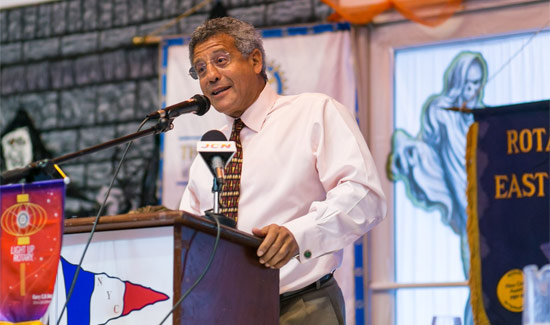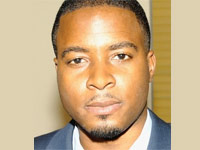DNA Leader Branville McCartney has ensnared himself in a classic conundrum that severely limits the viability of certain politicians: The more he speaks, the more the general public learns about his poorly conceived ideas, the quicker the loss of potential support. Sarah Palin is a typical example of this phenomenon.
Mrs. Palin still excites her base. But among other voters including independents there is a ceiling she has proven incapable of breaking, mostly because the majority of voters find her persona, politics and policy prescriptions unappealing. They cannot envision her as president of the United States.
The razzmatazz and hoopla surrounding various DNA launches, publicity exercises and media curiosity is diminishing, with an increasing number of potential voters jolted by many of Mr. McCartney’s statements and calling into question his credibility, substance and critical thinking abilities. It is highly unlikely that most Bahamians view him as a potential prime minister.
As long as she is not formally running for president, Mrs. Palin can continue to just tweet her way into the hearts of her more ardent supporters and carefully select her media appearances. Mr. McCartney does not have this luxury. While some in the media have given a number of his bizarre statements a pass, this is beginning to change. He is now coming under greater reportorial and editorial scrutiny.
XENOPHOBIC
Mr. McCartney has pandered to xenophobic hysteria, claimed that God has chosen him, made curious statements about marijuana smoking by voters during a by-election, proposed a constitutional change barring children born to illegal immigrants from access to applying for citizenship, and made wild charges with no evidence about political donations by a foreign government, among other public relations fireworks.
Asked if he would disclose his donors as a part of his promise of campaign financing, Mr. McCartney turned the hypocrite in record speed. Given an opportunity to act boldly rather than just offer glib talk, the DNA leader refused to become the brand of change in which he wants us to believe. The man who said he was different did not demonstrate the courage of his purported convictions.
The question voters have of any new party is: Is it a credible alternative? This speaks to the question of experience which is measured not only by time in politics and government, though time served is of considerable importance in every field from journalism and business to teaching and medicine.
Poor analogies are typically a sign of faulty reasoning and poor thinking. About two weeks ago the Bamboo Town MP suggested to Jeffrey Lloyd, host of “Jeffrey” on Star 105.6 FM, that the Bahamian people are the board of directors of the country, responsible for hiring and firing the nation’s chief executive.
The analogy is revealing of Mr. McCartney’s mindset. It is a brittle analogy. A country is essentially not like a corporation. While various qualities associated with business should be practised by government, the major purpose and various goals of the two are significantly different.
Leaving this aside, the Bahamian people are more like shareholders with the Cabinet being the board of directors. Ours is a parliamentary democracy with collective responsibility. Mr. McCartney seems to be running for president evincing in his public rhetoric a misunderstanding or purposeful ignorance of our system.
MISPERCEPTIONS
It would be a good civic deed were Mr. McCartney to help educate voters rather than pandering to general misperceptions. The constitution does not place executive authority in the hands of a single chief executive. The authority is placed into the collective hands of a cabinet.
Article 72 of the Bahamas Constitution provides that the Cabinet “shall have the general direction and control of the government of The Bahamas and shall be collectively responsible to Parliament”.
When the former minister recently thumped his chest on various immigration matters he claims he attempted to advance when he was in the Cabinet, he might have noted that the position taken by any minister on a particular matter before Cabinet is not to be revealed publicly. Further, ministers don’t make policy on an individual basis. That is the prerogative of the Cabinet.
For someone who boasts that he would have more total cabinet experience than Sir Lynden Pindling and Hubert Ingraham combined were he ever to assume the prime ministership, Mr. McCartney’s pronouncements on how our system works suggests a combination of studied and self-serving ignorance or just plain ignorance.
Like some, he is fixated on the personalities of Messrs Ingraham and Christie, who in all likelihood are entering their last electoral contest as leaders of their respective parties; which undercuts a significant part of the rationale for the DNA.
By no stretch of the imagination does Branville McCartney even remotely possess the leadership qualities of a Lynden Pindling or a Hubert Ingraham. Both men would run wide circles around him even if they had no cabinet experience and he had a lifetime in cabinet. They were battle-tested over many years with significant party and parliamentary experience before becoming prime minister.
Even so, had Sir Lynden been older and more mature before becoming premier he may not have succumbed to some of the temptations of power which brought harm to the country as well as to his legacy.
In our system, a potential prime minister is elected along with men and women who can form a government and are of such a calibre that voters view them as a credible government. In 1967 Sir Lynden had a deep bench with the likes of the great Sir Milo Butler, Arthur Hanna, Cecil Wallace Whitfield, Arthur Foulkes, Carlton Francis and Jeffrey Thompson among others.
Moreover, the PLP had been in existence since 1953 with thinkers and strategists immersed in the study of government and policy, and widely travelled in the interest of learning about party politics and parliamentary democracy. They were a part of a movement for majority rule which had matured through many years of struggle with experience forged in fire and a deep sense of history.
EXPERIENCED
In 1992, Hubert Ingraham led an FNM with two decades of experience as a party, seasoned politicians and mature and wise men and women as well as relative newcomers ready to form a government.
Sarah Palin repeatedly boasted she had more executive experience than Barack Obama. That assertion, similar to Mr. McCartney’s experience claim, requires no further comment. After his election, President Obama chose an impressive cabinet team with wide government and other experience.
In comparison to Messrs. Pindling, Ingraham and Obama, what will Mr. McCartney’s team look like and literally bring to the Cabinet table? For someone who is boasting of having had a few years in cabinet as a selling point, that his DNA has been in existence for less than a year contradicts his own logic.
Most of the DNA’s candidates are undoubtedly well-meaning people who love their country. With about half of its candidates nominated, voters have some idea of potential cabinet members and therefore legitimate questions about those who would serve in a McCartney-led cabinet.
Just as most voters appear not to see the DNA leader as prime minister, the view of his team as the Cabinet of The Bahamas is not credible to most voters.
Mr. McCartney noted during the “Jeffrey” interview that there are a good number of individuals in the PLP and FNM who may serve as prime minister. That claim cannot be seriously made of any of his announced candidates.
Recall Mr. McCartney’s corporate analogy about Bahamians hiring a chief executive to run the country? Any company that hires an untested CEO or a cadre of lower level to junior executives or an inexperienced board of directors would lose market credibility and stock value, not to mention incite a shareholder revolt.
Yet, Mr. McCartney proposes that the management and direction of the highly valued Bahamas Incorporated be turned over to a group of amateurs with no deep bench, no longstanding organizational experience as a political party nor a leader with the type of experience and ability that counts, including superior judgement and intellectual depth as well as credibility and maturity.
The vast majority of Bahamian voters, whether they are metaphorically viewed as members of a board of directors or as shareholders, are unlikely to approve such an initial public offering.
By Simon
Author of the Front Porch column in The Nassau Guardian
Commentator on www.bahama.pundit.com



